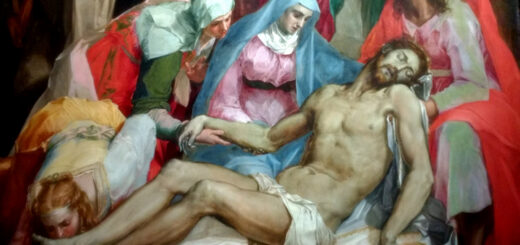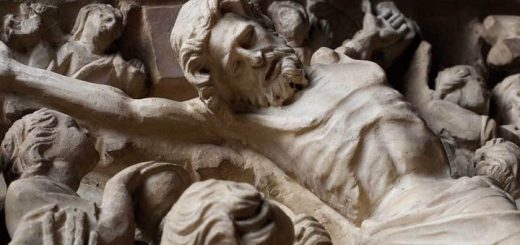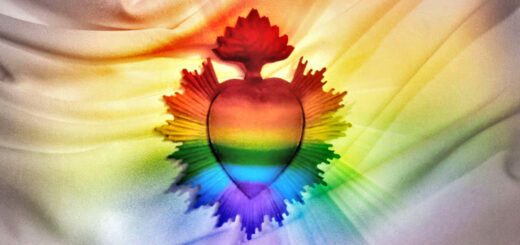Mother Maria Vittoria Longhitano a woman-premiere in Italy
Dialogue by Katya Parente With Mother Maria Vittoria Longhitano
When it was ordered, about ten years ago (it was May 22, 2010), there was a small media earthquake. It was the first Italian woman-pre-premiere, and was ordered in Rome, in a church of the Anglican communion. We are talking about Mother Maria Vittoria Longhitano, who granted us this long and very interesting interview.
Let's start by talking briefly about your church.
The episcopal Church, to which I am proud to belong, is an integral part of the Anglican communion - or the set of churches that have a structure, organization and practices that has its roots in the Anglican reform and which are in communion with each other.
Historically, it is nothing more than the name that the Church of England, present in the USA, taken shortly after the American revolution, when she was forced to cut the ties with the Church of England under penalty of treason, since the clergy of the Church of England was asked to swear loyalty to the British monarchy.
Chiaramente ebbe una crescita parallela, diversa, dopo l’autonomia dalla Corona Inglese, ed improntò dottrina, prassi e teologia sullo spirito degli Stati Uniti d’America, vale a dire con forti accenti di pragmatismo, egualitarismo ed attenzione ai diritti umani e civili (sempre protagonista nelle lotte per l’emancipazione, a cominciare dall’abolizione della schiavitù), mentre alcuni aspetti della sua prassi , teologia e vita liturgica risentirono dell’influenza puritana\calvinista.
This means that, today, the episcopal Church is the most advanced and progressive tip of the Anglican communion and, in this sense, holds many primates, including the ordination of the first woman priest, the first woman bishop, the first bishop declaredly gay, etc.
Today it is divided into nine provinces, and governs diocese outside the United States in Taiwan, Central America and South America, in the Caribbean and in Europe. The episcopal diocese of the virgin islands includes both the territories of the United States and the United Kingdom.
It includes 94 dioceses and 20 jurisdictions., The clergy is composed according to the tripartite order of bishops, priests and deacons, while ecclesiastical celibacy is optional. In almost all provinces, women can be ordered diagon, in many presbytere, and in some they can access the episcopate.
Religious orders were suppressed by Henry VIII, but in the nineteenth century they were restored and, currently, they were flourishing in almost all the Anglican world. Recently, the Rev. Episcopal Bishop for Europe, Mgr. Pierre Whalon, inaugurated the Carmelite fraternity of S. Maria del Monte Carmelo in Milan, of which the undersigned is founder and responsible, welcoming the temporary votes of the first sister on 5 November 2011.
A small chiosa in addition: Anglicanism maintains a particular position (called medium) between the Protestant churches and the Catholic Church, since it has maintained the ecclesiastical structure of Catholicism with the apostolic succession of the bishops, and also a traditional liturgy. The churches that are "in communion" with the heading of Canterbury make up the "Anglican communion".
For Anglicanism, according to the formulation of the theologian Richard Hooker, the religious authority is present in the Bible, in the tradition of the Church and in reason.
Great importance has the Book of Common Prayer, the book of common prayer, adopted by all Anglican churches, who have their common denominator in the liturgy rather than in confessions of faith. The 39 articles of religion, composed in the 16th century to guarantee religious uniformity in England, and which sometimes use theological expressions close to Calvinism, also fundamental. These articles are generally no longer considered strictly binding.
Anglicanism met in the nineteenth century, parallel to the spread of romanticism in Europe, a revival of the Catholic tradition within it. This current is called Anglo-Catholicism, whose maximum exponent was John Henry Newman, then converted to Catholicism and became cardinal.
Recently the Anglican and Catholic Church have signed a declaration about the Municipality I believe on the figure of Mary, Mother of Jesus, while remarkable passes seal the Catholic-Aggelician dialogue commission (Arch), recently gathered in Bose.
In this way, Anglican communion reiterated his original belief on Mary Mother of God and on Mary Model and example for the Church, admitting, unlike the churches of Calvinist inspiration, the veneration, thus getting closer to the Roman Catholicism, with which, as far as Mariology is concerned, the nodes of the dogmas of the Immaculate Conception of Mary and her assumption of the soul and body are still unsolved.
Obviously, the dogma of the Pope'sphalability and its universal jurisdiction is rejected.
Since when did you officially open to LGBT people?
In 1976 the first step was taken, which then led to the approval of homosexual weddings. The General Convention, the supreme body of government of the episcopal Church, has issued one declaration In which it reiterates that homosexual people are children and daughters of God and that, as such, they have full right to live their love relationships, as well as to acceptance and pastoral care, like all the faithful of the Church.
As it is easy to imagine this triggers debates at the local level, where by local we mean not only the provinces, but also the individual dioceses and even the parishes, the different communities, the universities, the movements and all the aggregations. Obviously, for reasons of space, savings the individual debates, the manifestations and moments of heroism by many brothers and sisters, and I immediately pass to 2006, a crucial moment. In 30 years the spirit moved and has actively operated thanks to the seed thrown by declaration of 1976.
Another "coup d'état" of the Holy Spirit was the election of the Rev. Gene Robinson - known for being the first declaredly gay priest - to Bishop of New Hampshire. It was a fairly sensational fact: bishop in an important Christian denomination still in possession of the historical episcopate. There have been strong internal contrasts, but Bishop Robinson, supported by his husband, carried out his mission until 2013. It was the first time ever in Anglican communion for a gay man and happily married to his partner.
In 2006 the General Convention, in rejecting a resolution that proposed the egalitarian marriage, however, reiterated that gay and lesbians are by virtue of the baptism in full parts of the body of Christ (i.e. of the Church), while, on behalf of the episcopal Church, he asked for forgiveness to his gay and lesbian members, and also for gays and lesbians not belonging to the episcopal Church, for discrimination, and invited. To convert to share the good news with all men and women, without any discrimination.
He committed himself - very important aspect - to include people who are declaredly gay and lesbian people in every body, committee, commission or working group, executive group, etc. That he had the task of dealing directly and indirectly of issues concerning sexuality and - which was very important - he committed himself to promoting this suggestion of the spirit towards the sisters of the Anglican Communion, or in any case of the churches that gravitate in the orbit of Canterbury. Since the Anglican communion has always been a brake, and the episcopal Church has always been considered extremely progressive, the same note reiterated that our baptism in Christ Jesus is and remains inseparable from our communion with the other brothers and sisters, so we also committed to acting in order to always keep unity with the churches of the Lambeth Conference. In short, an attempt to save goat and cabbage.
The turning point arrives in July 2009, when the General Convention adopts a resolution that allows individual bishops to choose whether to allow homosexual unions within their diocese. A sort of modern "Cuius Regio, Eius Religio", in order to preserve the so -called "Freedom of consciousness" by the bishops.
The resolution was designed as a compromise between those who ask for an official rite and those who proposed somewhat "soft" solutions. However, this resolution opened the door for the creation of an official rite, with the invitation to the bishops and bishops a "Collect and develop theological and liturgical resources" for the 2012 General Convention.
And in fact, on 9 July 2012, the episcopal church resolved an official rite called "The testimony and blessing of a permanent pact" con parole, espressioni, gesti e modalità liturgiche alquanto simili al matrimonio. Anche qui la soluzione è provvisoria e viene reinviata alla successiva General Convention. Rimane la facoltà dei vescovi\e di decidere per le loro Diocesi.
A partire dal 1 settembre 2012, il clero della diocesi episcopale di New York inizia a officiare matrimoni tra persone dello stesso sesso. Poi, nel 2015 si arriva al matrimonio egualitario. Fermo restando che ci vuole il permesso del vescovo\a diocesano e che il clero può, per motivi di coscienza, sempre rifiutare di celebrare le nozze tra due persone dello stesso sesso.
How many gay weddings have you celebrated?
I started already in 2010, the same year as my ordination. Let's say it was the first public marriage made in Italy, and had a strong media echo - even if I know that some pastor of other denomination has blessed some couple in private even earlier.
I had asked the Christian churches present in the Milanese territory if they could rent their place of worship for the wedding, but everyone refused. It was too unpanked and sensational gesture, outside the shadow of the sacristies, a celebration of the multiformity of love and, as the Gospel says, a lamp cannot be under the moggio, but must shed light. For this reason they preferred "privacy" before their ruling bodies resolved.
And until then, no Italian historical church had officially deliberated it. There was fear. I still retain the letters of insults and sheets with spit and flashes of Catholic neo -Nazi groups and fundamentalists, who promised hell for the undersigned. I was targeted by these insulting communication. In fact, we rented in Cormano a fenced and protected villa, and everything was done under the protection of the police.
From then on, I can't even count the number of gay couples I married: about thirty. And belonging to many Christian confessions. Majority members of the Roman Catholic Church. Which remained such. Since their Church does not allow this, and ours is a Catholic Church (in the sense of apostolic succession and the tripartite ministry), they saw a bit of an anticipation, a bit like their church projected into the future. Also because I am convinced that the Spirit blows where he wants and acts in all the churches: sooner or later he will open a breach even in the most conservative and traditionalist hierarchies.
Sometimes I also happened to be misunderstood.
For example, couples contacted me who practiced exchanges or frequented saunas, and who exchanged the opening for a sort of license to promiscuity. Christian marriage implies a series of commitments, including loyalty: if it was derogated to this for gay couples, it would be a discrimination upside down. I had to refuse them a canonical wedding. All this has happened because the media speak of us as a church that welcomes: but it does so by discerning the principles.
If the gay world has seen in the past, in the spasmodic exercise of its sexuality, a method of liberation from the patriarchate and by a sexophobic society, the categories of liberation in the Christian world are different. So I also understand that you are confused. While, of course, respecting all the points of view, I try to make it clear to couples. With lesbian couples I must say that all this is simpler.
I have never had difficulty considering the love between people of the same sex as valid. As a woman first of all, then as a person oversize, I have always heard looks and judgments on me. From an early age, since I said that when I grew up I wanted to be a priest, I felt that sense of sarcasm and irony, even on my innocent games: when I used the scarves to a stoles as a child, when the chips became hosties and I was so small that, not coming to the sink, I baptized the dolls in the bidet ... and I married them among them: obviously, all, all.
Then I can smile saying that from childhood I started with lesbian weddings! Seriously, my being overweight, my being an introspective girl meant that I lived my childhood, remembering the famous poetry of Geraldo Bessa Victor, like that "Negro child" that "He did not enter the Girotondo" And he looked, sad and wondered, a world that did not belong to him. And nobody, decided within me, had to feel like me more, nor as that child who "He did not enter the Girotondo", whatever the color of the skin, race, culture, sexual orientation and gender identity.
And the Church of Christ is a great Girotondo - indeed a circular embrace - inclusive, universal. This is precisely what means "Catholic": if a part of humanity (women, gays, etc.) is excluded from the Girotondo of life, the Church of Christ becomes a club for "Aristoi", that is, for the best (based on what then?).
One last question, this time personal. How do you feel to be the first priest woman in Italy?
To be the first priest woman ordered in Italy (some Italians have been ordered abroad, as well as my sisters of the Italian-American church) feels a great, enormous responsibility. Above all, for the media echo that this fact - normal already across the Alps - has had, and then because I am a character who often participates in television and radio broadcasts of national impact (as a fixed commentator on Republic of women).
The responsibility to convey the "normality" of a choice not mine but of God, and which, on an iconic level, has a certain impact. Because - I want to clarify - the churches that order women do not do it (not only) to defend the sacrosanct "human rights" but, paradoxically, to defend the right of God to call the Ministry whoever wants to: "It is not you who chose me but I who chose you and I made you because you bring fruit" (John 15:16).
And I feel the responsibility of bringing fruits of testimony of the welcome and inclusiveness of God, precisely through me: because if God has chosen me, it means that he can call anyone ... without any discrimination, also regardless of biological sex, sexual orientation or gender identity.
We thank Mother Vittoria for your availability. Thanks to her, what was a "simple" interview on gay marriages in the Anglican Church, has turned into an opportunity for knowledge and expansion of cultural horizons, two things that never hurt.






